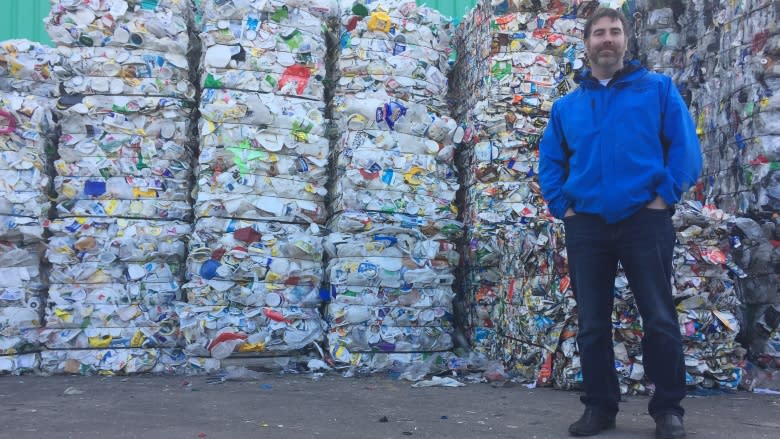Plastic debate bags the question: what to do with all our junk?
As Halifax staff research the idea of banning plastic bags in the municipality, they'll soon find themselves entangled in a global problem with no simple solutions.
Tony Walker, assistant professor in Dalhousie University's School for Resource and Environmental Studies, said six months ago, all seemed well. Much of the developed world was going along with decent recycling programs.
"Here in Nova Scotia, we were fairly ahead of the curve. In the late 1990s, early 2000s, we were probably doing better than the rest of North America and certainly the rest of Canada," he told CBC News in a phone interview Friday.
China says no
And then China closed the doors to our plastic bags. Walker said like many people he was surprised to learn that a Sobeys bag left for curbside pickup in Halifax sailed all the way to China to be recycled.
In a correspondence published in Nature Thursday, he said China's decision "could be a game changer if it weans us off plastic and forces us to seek sustainable alternatives."
Walker said while the headlines are dominated by the grocery bag issue, the problem is really all single-use plastics.
"We're surrounded by single-use plastics: straws, cups, bottles, that sort of thing. Plastic bags is one component of a large social problem."
Bags designed to last the trip home go on to last for a very long time, entangling animals, entering the food system, and winding up as microplastics in the bellies of birds and sea creatures. Perhaps even in that fish you brought home from the store.
Walker thinks it's most effectively dealt with at the federal level to create an even field for companies, provinces, municipalities and businesses across Canada. He points to the 2015 federal ban on microbeads, tiny plastic pellets used in skin care and exfoliation products.
The federal government could look at countries such as Germany, Denmark and Kenya, all of which have banned plastic bags.
"And yet Canada, perceived as a good environmental steward, has not done similarly," he said.
Clear federal guidelines would eliminate the hodgepodge of small decisions, where a local grocery store may ban grocery bags, but provide thinner bags usually used for fruit at the checkout.
B.C. producers must do own recycling
A second solution could be laws compelling the companies that produce the bags to ultimately dispose of them. "So if you're going to be a manufacturer of plastics or plastic bags, then you should also build into your business model the cost of end-of-life," Walker said.
Allen Langdon of Recycle B.C. told CBC's Information Morning: Cape Breton that the producers of all packaging and printed paper are responsible for recycling the material in his province.
"On behalf of the producers, we contract local governments, private operators, and sometimes non-profits to collect printed paper and packaging across the province," he said. "We pay for the collection; those collectors drop it off at our processor and we pay that processor and are responsible for managing that material ourselves."
He said it adds less than a cent per item. It's all done within B.C. Ontario has taken a similar approach.
Paris climate accord for plastics?
Walker will attend a UN-organized conference on the topic in March. He said it could be an early step toward an international agreement on plastics, similar to the Paris accord on climate change.
If the federal government doesn't step up, Jason Clyburne thinks Nova Scotia should, and it should work with New Brunswick and P.E.I. for a Maritime-wide policy.
Clyburne, a Saint Mary's University professor and the Canada Research Chair in Environmental Studies and Materials, said a unified policy would carry weight.
"We do generate waste and it's full of carbon. Rather than letting it rot or putting it into a disposal, I have been re-looking at new technologies that can be used for combustion and get energy from the waste," he said Friday.
A few years ago, he would have dismissed out of hand the idea of burning plastics to create energy. But Norway, Sweden and Denmark — famed for their green policies — have changed the equation lately. The Nordic nations, and much of the European Union, have embraced cleaner technologies to turn trash into energy.
A European Commission research unit says there is "enough waste energy produced in the EU to heat the EU's entire building stock."
"It opened my eyes to new technologies. I think it's something that we as Nova Scotians should reconsider," Clyburne said. "When you have waste streams that are relatively pure, it looks to me that combustion is now a possibility."
Little bags that carry great weight
Clyburne said grocery bags are likely a "pretty small" part of the overall plastics problem, but they are literally in the public's hands and so can act as a tool to increase our consciousness about the bigger issue.
"We don't really know a lot about what we actually do when we put our stuff out at the side of the road. It's the classic out of sight, out of mind attitude."
But as Halifax sends its mountains of plastic to an undisclosed landfill closer to home, the issue will remain in our sights, and on our minds.



